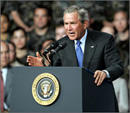
Bush Outlines U.S. Anti-terror Strategy
Says terrorists will fail because they have nothing positive to offer
Washington -- President Bush says the United States will "stay on the offense" in the War on Terror and will not relent in what he described as a "different kind of war" fought with military power, diplomatic power, intelligence and law enforcement.
"We'll complete our work in Afghanistan and Iraq,” the president said in an August 24 speech to the Idaho National Guard. "An immediate withdrawal of our troops in Iraq, or the broader Middle East, as some have called for, would only embolden the terrorists and create a staging ground to launch more attacks against America and free nations."
He described Iraq as "one of the most important battlefronts" in the broader war, and said that the success of a free Iraq will deal a "crushing blow" to terrorists who aim to dominate the region.
"So long as I am president we will stay, we will fight and we will win the war on terrorism," he declared.
Bush said that the global War on Terror, the United States has followed a consistent three-pronged strategy:
• Defending the homeland,
• Going after the terrorists "where they live," and
• Spreading "the hope of freedom across the broader Middle East."
The president said this war "affects the safety and security of every American," noting that over 1,700 soldiers of the Idaho Guard are currently serving in Iraq and that more than 243,000 members of the National Guard have been mobilized for various missions in the War on Terror since September 11, 2001.
He said that the National Guard’s service is needed in these dangerous times and that the United States remains a nation at war. He then listed places where terrorist attacks have occurred since September 11, 2001: Madrid, Spain; Istanbul, Turkey; Jakarta, Indonesia; Casablanca, Morocco; Riyadh, Saudi Arabia; the island of Bali; Baghdad, Iraq; London; and Sharm el-Sheikh, Egypt.
Noting the effect of terrorist control of Afghanistan under the Taliban regime, Bush said, "We will not allow the terrorists to establish new places of refuge in failed states from which they can recruit and train and plan new attacks on our citizens." Following September 11, 2001, terror attacks, Bush said he "made a decision -- America will not wait to be attacked again. … We will confront emerging threats before they fully materialize." And regimes harboring terrorists are just as guilty as the terrorists, he added.
DEFENDING THE HOMELAND
Discussing U.S. homeland defense, Bush cited strengthened intelligence capabilities, the training of more than 800,000 "first responders," and unspecified measures to protect U.S. cities and borders and infrastructure.
"We have taken the fight to the enemy in our midst," he said. "We've disrupted terrorist cells and financing networks in California and Oregon and Illinois and New Jersey and Virginia, and other states."
He added that the terrorists "blend in with the civilian population … emerge to strike, and then they retreat back into the shadows."
GO AFTER THE TERRORISTS WHERE THEY LIVE
The United States will not wait to be attacked again, but will go after the terrorists -- where they live, the president said.
This approach has the benefit of keeping terrorists on the defensive, he said. "When the terrorists spend their days and nights struggling to avoid death or capture, they are less capable of arming and training and plotting new attacks on America and the rest of the civilized world," he said.
SPREADING HOPE OF FREEDOM ACROSS THE BROADER MIDDLE EAST
The third part of the U.S. anti-terror strategy is the long-term tactic of giving the people of the broader Middle East "an alternative to [the terrorists'] ideology of hatred and fear," Bush said.
"So a key component of our strategy is to spread freedom."
The violence they are creating in Iraq, Bush said, clearly shows terrorists' determination to stop democracy from taking root in the Middle East. A free Iraq "will be a crushing blow to their strategy to dominate the region, and threaten America and the free world."
The terrorists will fail, Bush said, "because they have nothing positive to offer.”
The United States, its coalition allies and the Iraqi people "will prevail in this struggle because freedom is the permanent hope of mankind," Bush said.
A transcript of the president's remarks is available on the State Department’s Web site.
For additional information on U.S. anti-terror strategy, see Response to Terrorism.
Source: International Information Programs, U.S. Department of State


